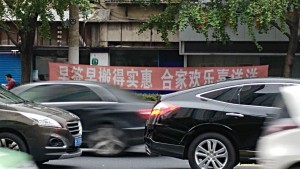Shanghai Street View: Change’s Challenges

As my 6 year sojourn in Shanghai rapidly winds down, a couple of items from my daily life this past week seem to nicely summarize many of the themes I’ve written about these last 4 years. One of those was related to China’s vast bureaucracy and propensity for scandals, while the other reflected the relenting change that is so much a part of daily life not only in Shanghai but throughout China.
The former instance involved a visit to my local bank, where my attempt to make a simple ATM money transfer turned into a half-hour-long ordeal that didn’t even end with accomplishment of my original task. The second saw a banner emerge outside a large residential compound slated for demolition near my home, encouraging residents to quickly sign agreements to relinquish their apartments in exchange for new ones outside the city.
Both events were quite typical for today’s Shanghai, which is why they seem like appropriate ways to close out my final Street View before moving to our city’s archrival, Beijing, to return to a job in journalism.
The first event in this final Street View occurred at my local bank and should have been quite straightforward. I simply wanted to transfer some money to a friend and thought I could conduct the transaction using an ATM, which is possible at most of Shanghai’s banks these days.
But I quickly discovered the ATM wouldn’t let me make the transfer, and found out I needed to visit a teller window to activate the function. Luckily no one was in line in front of me, and I thought I could quickly complete this simple function, which seemed unnecessary to start with, and then make my transfer using the ATM.
Of course I was mistaken, and the transaction turned into a half-hour-long ordeal that saw the teller input numerous data screens on his computer, take my photo at least 4 or 5 times, copy my passport and the application page another 4 or 5 times, and ask me to enter my PIN code at least twice. And when everything was done, I tried to make the transfer at the ATM and it still didn’t work.
Such bureaucracy has been a fixture in China for years, and has actually improved quite a bit since my first visit to the country in the 1980s. But the problem persists to this day in many places, including the immigration department that continually promises to improve the work visa application process for myself and other foreigners, only to frequently do nothing. Similar bureaucracy is equally frustrating for businesses and most average Chinese, though hopefully the situation will eventually improve to at least western-level standards over the next decade or two.
In this case the difficulties transferring money also seemed to reflect the steady stream of food safety, phone fraud and other scandals that seem to grip China regularly over the last decade. Banks are continually warning customers to beware of such fraudsters request money transfers, which is probably partly why they make such transfers more difficult.
Forced Relocation
Then there was the sudden notification that many residents received a few months ago at the compound next to my building, informing them their 1980s-era structure had been slated for demolition and they would soon have to leave their homes of several decades. Such relocations are another fixture of modern China, reflecting the nation’s rush to tear down older structures and build modern cities after 3 decades of very little new construction between 1950 and the 1980s.
Just a few months after the original notice was posted, many of the units are now empty and I expect the unimpressive complex will have a date with the wrecking ball in the next few months. Still, the banner that appeared one day this week encouraging people to sign relocation contracts, only to be quickly torn down the next, was a reminder of the occasional resistance to Shanghai’s breakneck change, which often leaves people feeling a bit unsettled.
Over the last 4 years I’ve had a chance to chronicle many of those changes that seem to constantly seize Shanghai, often as explosions of new concepts and services like convenience stores, coffee shops, asset management companies and Internet-based take-out dining services. Many of those have come and gone, including 3 recently shuttered convenience stores and another 2 closed asset management companies near my home.
At the end of the day, it has often felt like a roller-coaster ride living and working in Shanghai these last few years. I expect the bureaucracy, scandals and breakneck change will continue for a while longer, since there’s still much work left to do. But hopefully at the process we’ll see the emergence of a modern, world-class metropolis, as Shanghai resumes its place as one of Asia’s most international cities.
